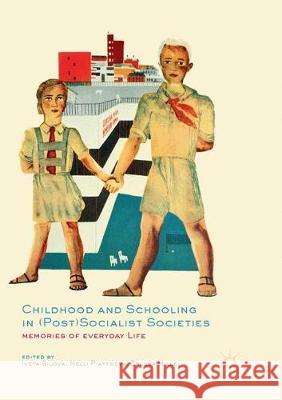Childhood and Schooling in (Post)Socialist Societies: Memories of Everyday Life » książka



Childhood and Schooling in (Post)Socialist Societies: Memories of Everyday Life
ISBN-13: 9783319873978 / Angielski / Miękka / 2018 / 297 str.
Childhood and Schooling in (Post)Socialist Societies: Memories of Everyday Life
ISBN-13: 9783319873978 / Angielski / Miękka / 2018 / 297 str.
(netto: 344,21 VAT: 5%)
Najniższa cena z 30 dni: 346,96
ok. 22 dni roboczych
Dostawa w 2026 r.
Darmowa dostawa!
"There is an abundance of material in the book that offers itself for such further engagement, material that is evocative and inspiring, with the potential to incite similar (and follow-on) projects. If not for this reason alone, the sheer pleasure of indulging in personal accounts that are at the same time analytically reflected allow for the hope that this book might be widely read." (Robert Hamm, Other Education - The Journal of Educational Alternatives, Vol. 9 (2), 2020)
"This book should be of interest to scholars in a variety of fields, but particularly to historians of childhood, education specialists, and social scientists. ... the book makes a powerful argument against viewing (post) socialist life as a series of simple dichotomies or children in (post)socialist contexts as vessels passively filled by state institutions or ideologies, thus joining an increasing number of recent works that point out the insufficiencies of such frameworks for understanding what it meant to live (post)socialism." (Julie deGraffenried, The Journal of the History of Childhood and Youth, Vol. 12 (2), 2019)
"This book is bold in its vision and ambitious in its scope. Its appeal is manifold and rich. Theoretically, its appeal lies in its provocative decolonial lens of understanding childhood and (post)socialism and the concurrent challenges it brings to dominant concepts in comparative education." (Simona Szakacs, European Education , January, 17 , 2019)
Iveta Silova is Professor at Mary Lou Fulton Teachers College at Arizona State University, USA. Her research focuses on the study of globalization and the intersections of postsocialist, postcolonial, and decolonial perspectives in education.
Nelli Piattoeva is a Senior Lecturer at the Faculty of Education, University of Tampere, Finland. She is interested in the post-Soviet audit culture and its effects on schools, as well as the production of numerical data on education and the political work done with numbers.
Zsuzsa Millei is a Senior Research Fellow at the Institute for Advanced Social Research, University of Tampere, Finland. Her work explores the cultural politics of childhood, childhood and nation, childhood as a political form of being, and children as political actors.
This book explores childhood and schooling in late socialist societies by bringing into dialogue public narratives and personal memories that move beyond imaginaries of Cold War divisions between the East and West. Written by cultural insiders who were brought up and educated on the eastern side of the Iron Curtain - spanning from Central Europe to mainland Asia - the book offers insights into the diverse spaces of socialist childhoods interweaving with broader political, economic, and social life. These evocative memories explore the experiences of children in navigating state expectations to embody “model socialist citizens” and their mixed feelings of attachment, optimism, dullness, and alienation associated with participation in “building” socialist futures. Drawing on the research traditions of autobiography, autoethnography, and collective biography, the authors challenge what is often considered ‘normal’ and ‘natural’ in the historical accounts of socialist childhoods, and engage in (re)writing histories that open space for new knowledges and vast webs of interconnections to emerge. This book will be compelling reading for students and researchers working in education, sociology and history, particularly those within the interdisciplinary fields of childhood and area studies.
‘The authors of this beautiful book are professional academics and intellectuals who grew up in different socialist countries. Exploring “socialist childhoods” in myriad ways, they draw on memories, and collective history, emotional insider knowledge and the measured perspective of an analyst. What emerges is life that was caught between real optimism and dullness, ethical commitments and ideological absurdities, selfless devotion to children and their treatment as a political resource. Such attention to detail and examination of the paradoxical nature of this time makes this collective effort not only timely but remarkably genuine.’
—Alexei Yurchak, University of California, USA
1997-2025 DolnySlask.com Agencja Internetowa
KrainaKsiazek.PL - Księgarnia Internetowa









